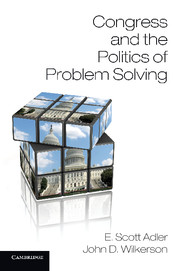Preface
Published online by Cambridge University Press: 05 January 2013
Summary
Preface
In this book, we offer a perspective on U.S. lawmaking that draws on long-term, large-scale patterns and developments in Congress. After gathering and analyzing information regarding thousands of proposed, enacted, and failed legislative proposals we came to a singular conclusion – contemporary legislative studies seem to be overlooking key aspects of what legislatures do. These studies tend to have a common theme – the institution no longer functions. The proffered causes are numerous – a politically polarized citizenry, ideologically rigid lawmakers, party strategy, increased electoral competition, campaign finance, economic inequality, etc. Certainly, we recognized the conflict and divisiveness that other studies emphasize. But our data also pointed to additional dynamics that were receiving much less attention. In particular, the issue area seemed to matter – a great deal.
Congress often surprises. The 111th Congress (2009–10) was frequently described as the most polarized of the last century – the epitome of a dysfunctional Congress. Yet, it ultimately turned out to be one of the most productive as well. How can this happen? Our answer highlights the question of how certain issues end up on the legislative agenda. Examining congressional agendas and policy change across many years, we find that policy making is often spurred by problem solving. Issues become the subject of new legislation for reasons that have less to do with party or lawmaker priorities, and more to do with events in society and established lawmaking routines that encourage policy updating. Lawmakers have electoral incentives to be responsive to such problems because most voters care as much (if not more) about whether problems are addressed as they do about how those problems are addressed. A problem-solving perspective not only portends that Congress will be more productive than many contemporary perspectives suggest, but it also anticipates why. When we systematically examine the legislative agenda and policy change, we find that congressional politics revolves in large part around problem solving. Even when dysfunction seems to be at its peak, problem-solving motivations still give lawmakers reasons to search for common ground. The pages that follow explain the principles of our problem-solving perspective and how this approach reveals new insights about Congress’s organization, operations, and output.
- Type
- Chapter
- Information
- Congress and the Politics of Problem Solving , pp. xi - xivPublisher: Cambridge University PressPrint publication year: 2013



